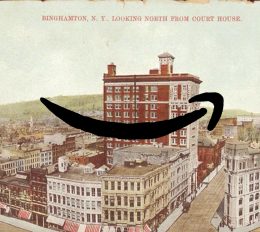
According to a recent Pipe Dream article, local politicians have been vocal in their support for Amazon setting up shop in Binghamton. That is a major problem.
Amazon is a toxic convenience in our modern consumer culture, and not just for its notoriously horrible working conditions and its refusal to pay taxes. The environmental impact of two-day shipping has been well-documented. Though corporations like Amazon are the major causes of global climate change, we cannot ignore the effects our choices as consumers have, and the range of variably ethical options open to us. We don’t need to be able to buy every product we use on the same website without leaving the comfort of our homes. We don’t need two-day shipping. What we need is a planet that is still habitable in 50 years, and a sustainable local economy that fosters a sense of community among people who already live here.
If you can buy something locally or in person, you ought to; you’d be rewarded for doing so. Yes, there are some things that are impossible to find locally or in person, but these are a minority. Yes, transportation between campus and Downtown Binghamton is lacking, but it exists. If you believe in living and consuming ethically, you must ask what your dollars are doing. Are your dollars going to make the richest man in modern history, someone richer than anyone needs to or even should be, even richer? Or are your dollars staying in your local community, feeding and educating your neighbors’ kids, encouraging them to stay here and give back? When you patronize local businesses, you don’t just support our community economically, you are helping to build a lasting social community.
Putting dollars into a computer will have cheap commodities show up at your door in two days. Putting dollars into local businesses will give you those same commodities and will give you a positive interaction with a human being with whom you have a mutually responsible relationship. I have social anxiety. I am introverted. I understand the trepidation some may feel in going to a store and having to interact with people. But I guarantee these workers, these business owners, want to create a positive relationship with you, whatever that means for you. As students, we should ask ourselves what we can do to connect with our surrounding community. Buying local is one way to accomplish this.
Amazon may bring some money to Binghamton, but we have to ask: At what cost, and for how long? When we had IBM and the EJ Corporation, Binghamton thrived. But what did these corporate giants do? What will all corporate giants do as soon as it is profitable to do so? Leave. They have no genuine investment in this city. Amazon may offer some jobs to Binghamton in the short-term, but in a few generations, when it’s convenient, it will abandon us. We cannot put our region through this same boom-bust cycle. We have to build sustainable and lasting prosperity.
Amazon is not the way to accomplish this. The company undermines the prosperity of thousands of communities just like Binghamton across the country by sucking capital out of local businesses and local economies. If Jason Garnar, Anthony Brindisi and John Katko want to make Binghamton a better place to live, they shouldn’t make it a stopping point for Jeff Bezos’ bank account, hoping some spare change falls out in transit. These politicians must invest in local businesses that already call Binghamton home. The future of Binghamton depends on it, and the future of our planet depends on leaders in communities across the world doing the same.
For those who want to learn how to do their part, check out local business initiatives like Be Local Broome or similar programs being successfully implemented in different cities across the country.
Brian Neggie is a senior double-majoring in English and anthropology.


